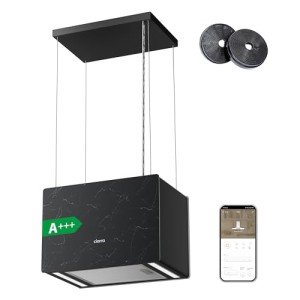What's The Job Market For Island Cooker Hood Extractor Fan Professiona…
페이지 정보

본문
Island Cooker Hood Extractor Fan: The Essential Guide
In modern kitchen style, the island cooker hood extractor fan has actually become a crucial device, marrying performance with aesthetic appeals. As kitchens progressively change into multifunctional spaces where cooking, dining, and mingling occur, the value of a reliable ventilation system can not be ignored. This article intends to check out the benefits, types, installation factors to consider, and maintenance practices connected with island cooker hood extractor fans.
What is an Island Cooker Hood Extractor Fan?
An island hob cooker hood extractor fan is a ventilation home appliance suspended from the ceiling above a kitchen island or countertop. Its main function is to draw out airborne grease, smoke, steam, and smells developed throughout cooking. Unlike wall-mounted hoods, island hoods offer unobstructed views and preserve a streamlined style, vital for open-plan living areas.
Advantages of Installing an Island Cooker Hood Extractor Fan
- Boosted Air Quality: Removes impurities from the air, promoting a much healthier cooking environment.
- Aesthetic Appeal: Available in numerous designs, they act as a focal point in modern kitchen areas.
- Noise Reduction: Many designs use quiet operation, allowing for comfy kitchen conversations.
- Improved Lighting: Some hoods feature integrated lighting to light up the cooking surface better.
Kinds Of Island Cooker Hood Extractor Fans
Island cooker hood extractor fans can be classified based upon their performance and style. Here's a breakdown of the different types:
| Type | Description |
|---|---|
| Ducted Hoods | Ventilate air outside through ductwork; suitable for heavy cooking tasks. |
| Ductless Hoods | Use filters to cleanse air and recirculate it back into the kitchen; much easier to set up and keep. |
| Convertible Hoods | Can be transformed from ducted to ductless; offers versatility based on kitchen setup. |
| Wall-Mounted Hoods | Installed versus the wall however can be utilized above an 48 island range hood if configured properly. |
Factors to Consider Before Installation
When considering an island cooker hood extractor Island cooker fan, there are numerous elements to keep in mind:
Size and Height: The hood needs to be proportional to the cooking surface area. A general rule is to have the hood 30-36 inches above the cooking surface area.
CFM Rating: Consider the CFM (Cubic Feet per Minute) ranking, island cooker which shows the air flow capacity. Higher CFM appropriates for heavy cooking.
Noise Level: Look for design specs worrying noise levels, determined in sones. Go for a ranking of 1.5-3 sones for quiet operation.
Style: Aesthetic appeal is important. Choose a hood that complements the kitchen's general design, consisting of products and surfaces.
Lighting and Features: Consider designs with integrated LED lights and extra functions like variable fan speeds.
Setup Process
Installing an island cooker island hood extractor fan usually requires professional assistance due to the intricacies involved. Nevertheless, here's a short introduction of the installation steps:
Preparation: Select the proper place above the kitchen island and guarantee there's enough space for ducting if required.
Installing: Secure the installing bracket to the ceiling, ensuring it is level and anchored into a joist for proper assistance.
Ducting (if applicable): Run ductwork from the hood to the exterior of the home, guaranteeing it is insulated to lessen heat loss if you're utilizing a ducted choice.
Electrical Connections: Connect the electrical wiring as per the maker's instructions, guaranteeing compliance with all local electrical codes.
Testing: Once installed, confirm the fan operates properly and evaluate the lighting functions.
Maintenance Tips for Island Cooker Hoods
To prolong the life and performance of an island cooker hood extractor fan, regular upkeep is essential. Here are some useful suggestions:
Regular Cleaning: Clean the outside and filters at least as soon as a month to prevent grease accumulation.
Filter Replacement: If utilizing a ductless hood, change carbon filters every 3-6 months for ideal efficiency.
Examine Ducts: For ducted models, guarantee that ducts are tidy and devoid of clogs to keep effective airflow.

Examine Lights: Regularly check and replace burnt-out bulbs to make sure adequate lighting throughout cooking.
Frequently Asked Questions About Island Cooker Hood Extractor Fans
Q1: Do I require a license to set up an island cooker hood?A1: It depends upon regional building regulations. It's best to talk to regional authorities or a professional installer. Q2: Can I set up an island
cooker hood myself?A2: While some helpful property owners may try
it, employing a professional is advised due to the intricacies associated with ducting and electrical work. Q3: How do I pick the right CFM for my needs?A3: A basic guideline is
to have 300 CFM for every 10,000 BTUs of the stove. For
heavy cooking, consider a greater CFM ranking. Q4: How often ought to I clean my island extractors cooker hood?A4: The exterior and filters should be cleaned up
monthly, while carbon filters in ductless designs should be replaced every 3-6 months. Q5: Are there energy-efficient designs available?A5: Yes, lots of manufacturers offer energy-efficient choices that can help conserve on electricity expenses. An over island extractor fan cooker hood extractor fan is an integral addition to any modern-day kitchen, balancing aesthetic appeal with practical functionality. By understanding the types available, thinking about essential installation factors, and embracing regular maintenance practices, property owners can guarantee their kitchen remains a fresh and welcoming area. Whether choosing ducted or ductless alternatives, purchasing a quality island hood ensures a cleaner, much healthier cooking environment.
- 이전글Nine Things That Your Parent Teach You About L Shaped Loft Beds 25.05.19
- 다음글10 Mistaken Answers To Common Treadmill Fold Flat Questions Do You Know The Correct Answers? 25.05.19
댓글목록
등록된 댓글이 없습니다.


